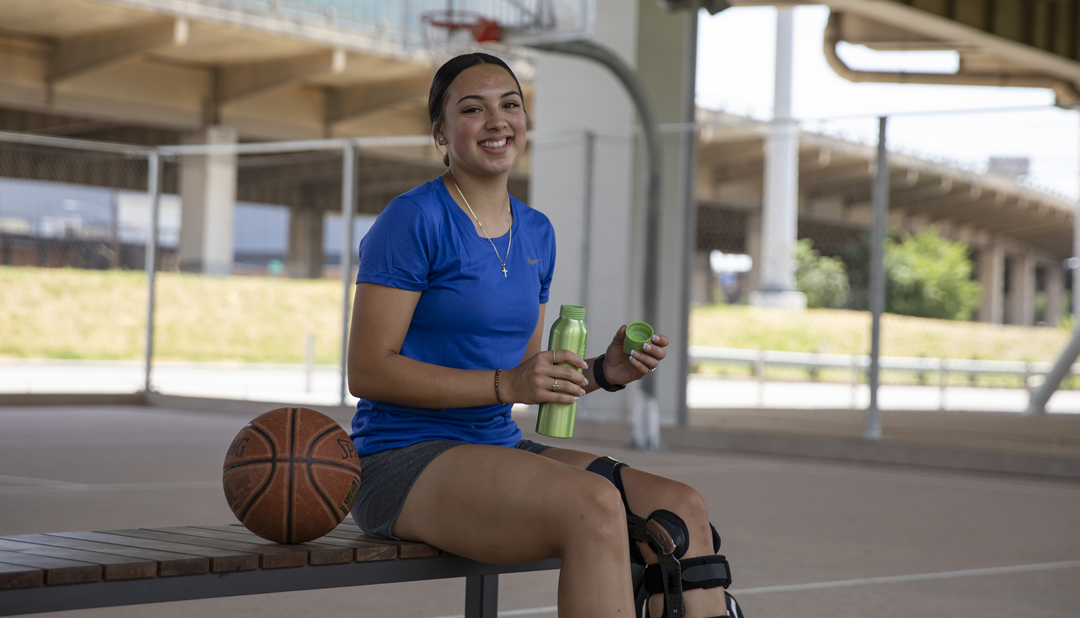Parents of student-athletes are familiar with the long days of practices before school, hours of schoolwork and games in the evening. Our sports dietitian, Taylor Morrison, M.S., R.D.N., CSSD, L.D., shares everything parents of busy young athletes need to know about fueling well, eating enough and staying hydrated to support their stacked schedules.
When trying to ensure your athlete is getting enough fuel and enough nutrition for sports and school, start by focusing on three key things:
- Maintain energy levels with meals and snacks that provide both quick and sustained energy.
- Stay hydrated.
- Recover well.
Maintaining Energy Levels
It’s important that young athletes keep their brains and muscles well-fueled throughout the day, starting when they get up in the morning. This is crucial so they not only perform their best in school but also so that they show up for sport practices energized with plenty of fuel in the tank to use for their sport. When athletes show up to practices with depleted energy stores, they run the risk of dizziness and fatigue in the short-term and decreased strength and overall performance long-term.
To know what foods to choose in their fueling strategy, it’s important that they have a basic understanding of the macronutrients, including carbohydrates, protein and fat:
- Carbohydrates are the best and quickest source of fuel for the brain and muscles. This macronutrient can be used for energy in a young athlete in anywhere between 15 and 60 minutes after consumption, depending on the specific food they choose. These should be included in all meals and snacks throughout the day and can be a great snack 15 to 60 minutes before a practice. Foods high in carbohydrates include grains, such as bread or granola, and starches, such as potatoes or rice.
- Protein is important for building and maintaining muscle and for injury recovery. It takes a little longer for the body to use protein for energy, so it is best left out of the pre-practice snack unless the athlete has a good 90 minutes or more before start time. It is, however, an important part of meals and the athlete’s recovery snacks. Foods high in protein include meats, such as beef, chicken, turkey, fish and seafood and eggs, and dairy products, such as milk or yogurt.
- Fat is another important energy source for young athletes. These foods can also help fight inflammation and are crucial for the body to absorb certain vitamins (specifically A, D, E and K). However, it takes the body the longest to digest fat, so it should be kept out of the pre-practice snack and saved for the post-event meal or for meals and snacks that are a few hours away. Foods high in fat include certain cuts of meat, cheese, avocados, nuts and eggs.
For more information on how to incorporate meals and snacks around a busy training session, refer to our Tournament Nutrition guide.
Staying Hydrated
Athletes should understand the importance of drinking water and fluids throughout the day, starting when they wake up in the morning. Drinking 24 ounces from a water bottle 10 minutes before warmup will not make up for the fact that the athlete forgot to drink any water earlier that day. It will likely just leave him or her uncomfortable during the event and needing to take a bathroom break.
When asked what is best to drink, water should be the go-to drink of choice. If an athlete has trouble drinking fluids during the day, remember that foods can help hydrate as well. Sports drinks are best for when an athlete has been practicing for an hour or more or it is a very hot and humid environment. There are a few other instances where a sports drink is helpful, and these special situations include:
- The athlete has trouble eating solids before or during an event due to nerves.
- The athlete is a salty sweater.
- The athlete struggles with muscle cramping during events.
A factor to consider when choosing drinks and electrolyte packets is the age and stage of development the athlete is in. Before puberty, an athlete regulates body temperature differently than an adult, relying less on sweat to cool the body and, therefore, losing less electrolytes. An 8-year-old basketball player will likely not need the electrolyte replacement that a 17-year-old basketball player will need.
For more support in helping your young athlete hydrate, check out our Hydration for Young Athletes handout.
Recovering Well
Just because the game or practice is over does not mean athletes should forget about nutrition. This is especially true when the athlete is in back-to-back events or has a quick turnaround time between games. This could mean multiple games in a day, or it could look like a game ending in the evening and the next game early in the morning. During these small windows, the recovery fuel counts.
The three key components of a great recovery snack are:
- Carbohydrates
Carbohydrates replenish depleted energy stores in the muscle, which then prevents the body from breaking down protein (muscle) for fuel moving forward.
- Protein
Protein that the athlete eats helps to rebuild and repair the muscle that is naturally broken down a little with exercise. It will also help maintain the athlete’s strength.
- Fluid
Fluid will rehydrate the body to keep energy levels up and prevent dehydration.
For more info on recovery snacks, check out our handout, blog post or the below video!
For more sports nutrition information, visit www.scottishriteforchildren.com/nutrition.

